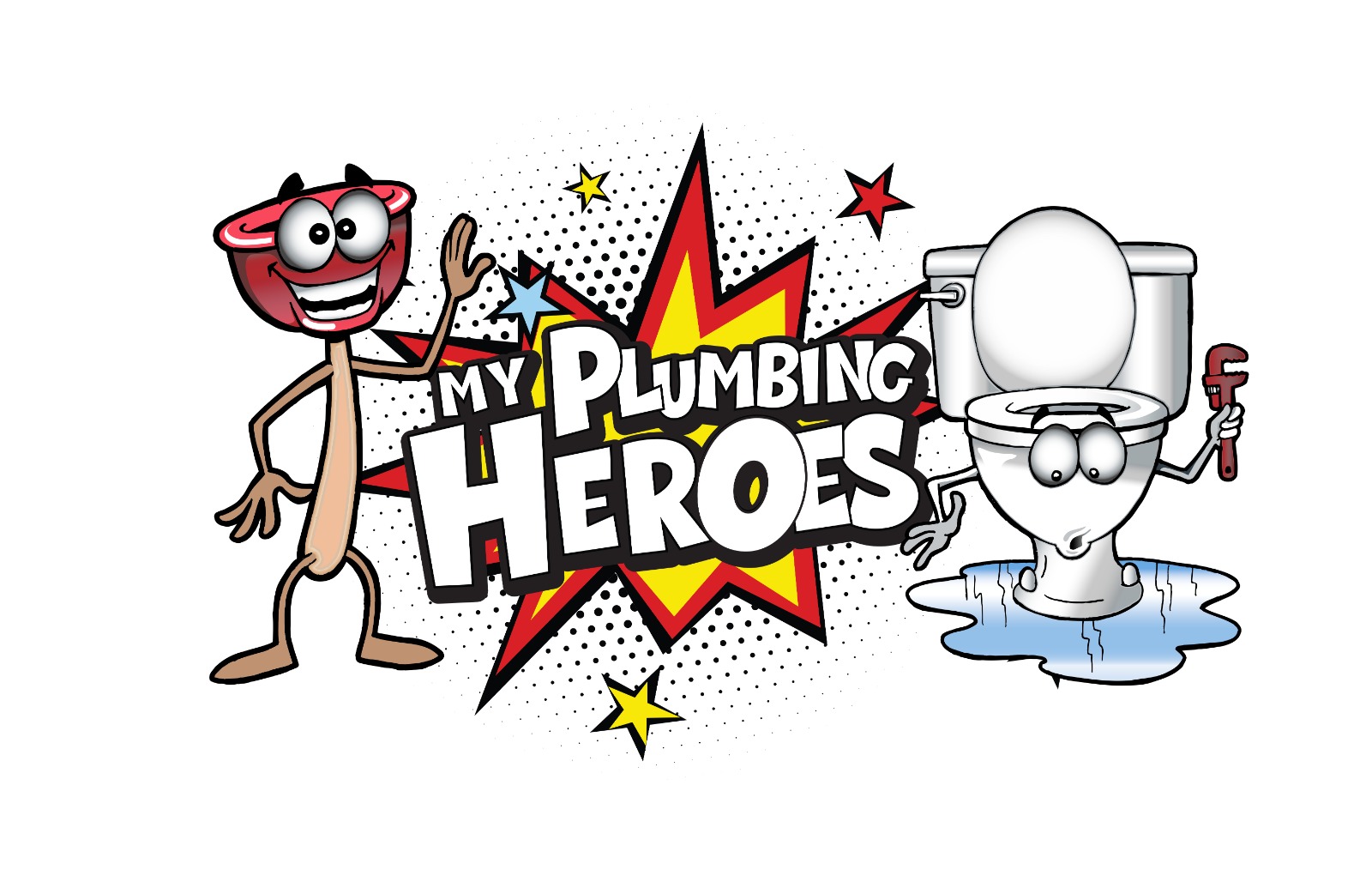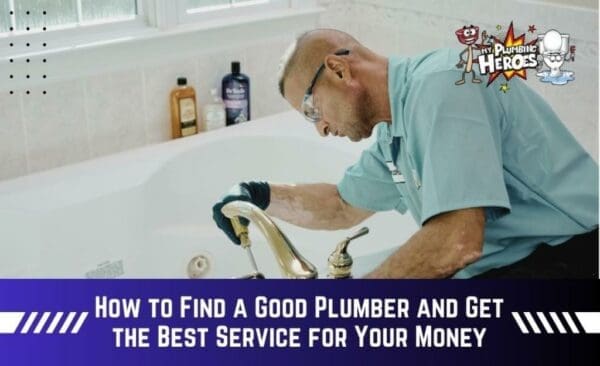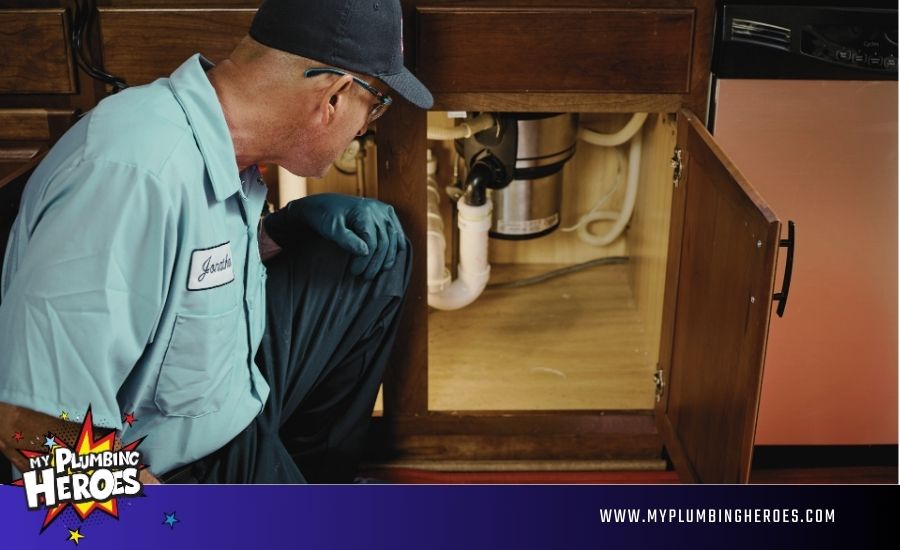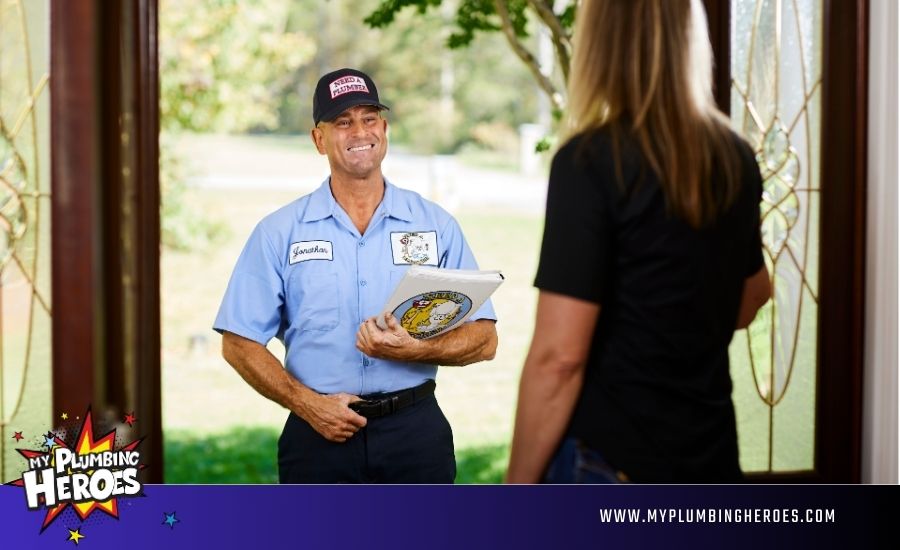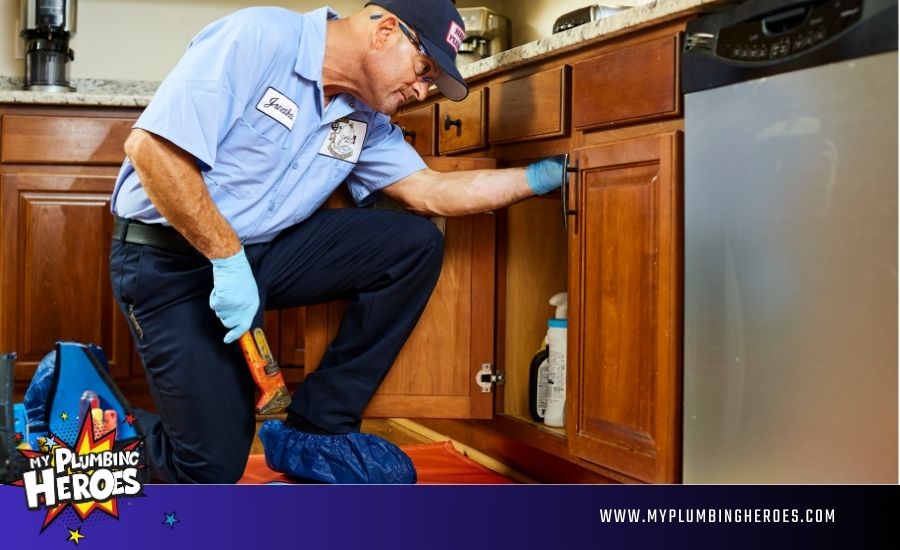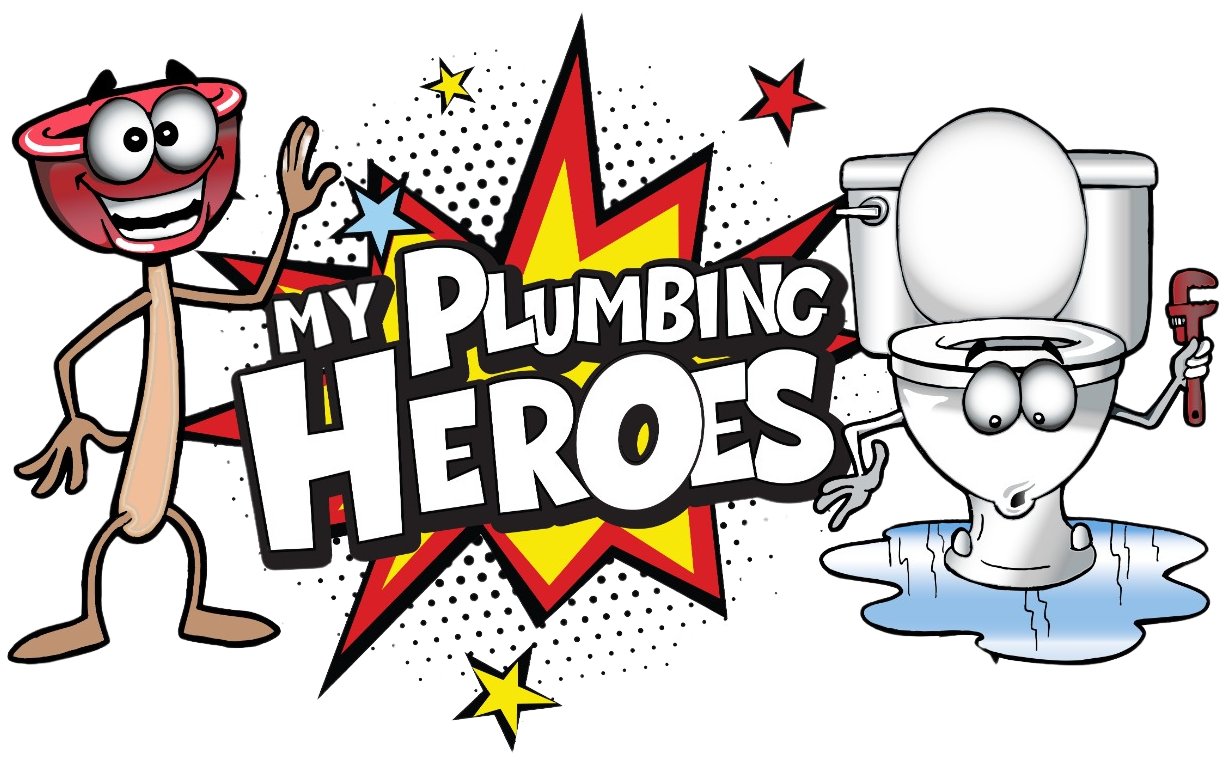Finding a good plumber is like searching for a needle in a haystack. Have you ever faced a plumbing emergency and wondered, "How do I even start to find a good plumber?" You're not alone. This common dilemma can turn into a real headache without the right guidance. Our guide is here to transform that headache into a clear path forward, connecting you with reliable plumbing services.
- Quick Tips to Find a Good Plumber
- Start with Recommendations
- Check Online Reviews
- Verify Licenses
- Understanding What Makes a Plumber "Good"
- Credentials and Certifications: What to Look For
- Experience in the Field: Why It Matters
- Customer Reviews and Feedback: Reading Between the Lines
- Comprehensive Guide to Finding a Good Plumber
- Gathering Recommendations: Where to Start
- Verifying Licenses and Certifications: Ensuring Legitimacy
- Evaluating Online Reviews: Identifying Genuine Feedback
- Requesting and Comparing Quotes: Finding the Best Value
- Tips for Communicating with Plumbers
- Preparing Your Questions: What to Ask
- Understanding the Scope of Work: What to Expect
- Discussing Costs Upfront: Avoiding Surprises
- Red Flags to Avoid When Choosing a Plumber
- Lack of Proper Licensing: A Deal-Breaker
- Negative Reviews and Complaints: Warning Signs
- Extremely Low Quotes: Understanding the Risks
- Maximizing Value: Ensuring You Get the Best Service for Your Money
- Understanding Pricing and Quotes: A Closer Look
- The Importance of a Clear Contract: What Should Be Included
- Tips for Negotiating with Plumbers: How to Approach
- Maintaining Your Plumbing: Preventive Measures and Tips
- Regular Maintenance Checks: A Schedule
- DIY Tips for Minor Issues: When to Handle It Yourself
- When to Call a Professional: Recognizing the Signs
- Frequently Asked Questions
- What qualifications should a good plumber have?
- How much does it usually cost to hire a plumber?
- Can I fix plumbing issues, or should I hire a professional?
- How do I know if a plumber is trustworthy?
- What should I do if the plumbing work is not up to my expectations?
- Why Choose My Plumbing Heroes in Nokesville, VA?
In this article, we'll share insider tips and strategies for finding a good plumber. You'll learn:
- Quick Tips to Jumpstart Your Search
- Understanding What Makes a Plumber Good: Looking beyond the wrench
- Comprehensive Guide: A step-by-step process to finding the best
- Red Flags: What to watch out for to avoid making a costly mistake
- Maximizing Value: How to ensure you're getting the best service for your money
Quick Tips to Find a Good Plumber
Finding a good plumber should be different from looking for a hidden treasure. It's about knowing where to look and what to ask. So, let's talk about how you can kickstart your journey to discover a reliable plumbing expert. The secret? Begin with people you trust.
Start with Recommendations
Asking for recommendations is your first step. Your friends, family, and neighbors have all had to call a plumber at some point. They can give you the inside scoop on who did a great job and who didn't. Here’s why starting with recommendations is smart:
- Trustworthy Source: You get reviews from people you trust, not just random online ratings.
- First-Hand Experience: They can share their direct experiences, good or bad.
- Local Insight: Recommendations often lead to local professionals familiar with your area's plumbing needs.
Here's how to get the most out of recommendations:
- Ask specific questions: Don't just find out who they hired. Ask what made the plumber stand out. Was it their punctuality, clear communication, or perhaps the quality of their work?
- Gather multiple opinions: More feedback gives you a clearer picture. If you hear a name come up various times, that’s a good sign.
- Note the context: Was the job similar to what you need? A plumber great at fixing leaks might not be the best for bathroom renovations.
Check Online Reviews
After you've got some names from people you know, it's time to see what the wider world thinks. Online reviews can give you a broader perspective on a plumber's reputation. Websites like Yelp, Google, and industry-specific platforms offer a wealth of information. Here's how to make sense of what you find:
- Look for patterns: A single bad review in a sea of praise might be an outlier, but if complaints are common, take note.
- Read recent reviews: A plumber’s quality can change over time. Recent feedback is more relevant than older comments.
- Consider the response to feedback: Does the plumber reply to reviews, especially negative ones? Their responses show professionalism and a willingness to resolve issues.
Verify Licenses
Verifying licenses is crucial. You want someone who's not just skilled but also legally certified to work in your home. Plumbing involves regulations and standards; a licensed plumber will know these inside and out. Here's your checklist for this step:
- Confirm with local authorities: Each area has its requirements. A quick call or website visit can confirm if a plumber is up to date with their licenses.
- Ask the plumber directly: A reputable plumber won’t hesitate to share their licensing information.
- Check insurance: Along with licenses, ensure they have liability insurance to protect both of you during the job.
Understanding What Makes a Plumber "Good"
Identifying a good plumber goes beyond picking someone who can stop a leak. It's about finding a professional who combines skill, reliability, and integrity. A good plumber respects your time, provides clear communication, and delivers quality work at a fair price. But how can you be sure you're choosing someone who ticks all these boxes? It starts with their credentials and certifications.
Credentials and Certifications: What to Look For
Regarding plumbing, the proper credentials and certifications are not just fancy titles – they're proof of a plumber's commitment to their craft and adherence to industry standards. Here’s what you should check:
- State Licensing: This is the big one. A state license confirms that the plumber has met specific training and experience requirements. It's the minimum you should expect.
- Insurance: Ensure they have liability insurance and worker's compensation. This protects you and them if something goes wrong.
- Professional Associations: Membership in groups like the Plumbing-Heating-Cooling Contractors Association (PHCC) shows commitment to ongoing education and ethical standards.
- Certifications for Specialization: Look for certifications in areas like gas fitting, green plumbing, or other specializations that match your needs.
- Continuing Education: Good plumbers keep up with the latest technologies and methods. Ask if they’ve taken any recent courses.
Experience in the Field: Why It Matters
When you're hunting for a good plumber, their experience in the field can tell you a lot. It's not just about the years; it's about what they've learned and accomplished during that time. An experienced plumber has seen various situations and knows how to handle unexpected challenges. Here's why experience is crucial:
- Problem-solving skills: More time on the job means they're likely to have previously encountered and solved your issue.
- Efficiency: Experienced plumbers can diagnose and fix problems faster, saving time and money.
- Advice and recommendations: They can offer valuable insights on maintaining your plumbing system and avoiding future issues.
- Reliability: A track record of successful projects suggests they're dependable.
- Versatility: They're more likely to have the skills to handle various plumbing tasks, from simple repairs to complex installations.
Customer Reviews and Feedback: Reading Between the Lines
Customer reviews and feedback are gold mines of information, but it's essential to read them with a critical eye. Reviews can give you a sense of a plumber's reliability, quality of work, and customer service approach. Here’s how to get the most from what you read:
- Look for detailed reviews: These often provide the most insight into what working with the plumber is really like.
- Consistency is key: A single excellent or poor review doesn’t tell the whole story. Look for patterns in what customers say.
- Notice how they handle criticism: A professional plumber responds to negative feedback constructively and without hostility.
- Timing of reviews: Recent reviews are more indicative of the plumber's current standards.
- Reviewer credibility: Some platforms verify that reviews come from actual customers, which can add to their reliability.
Comprehensive Guide to Finding a Good Plumber
Trying to find a good plumber can seem daunting, but it becomes much more manageable with a strategic approach. This comprehensive guide will walk you through the crucial steps, ensuring you're well-equipped to make an informed choice. A reliable plumber not only fixes immediate issues but also helps prevent future problems, saving you time, stress, and money in the long run.
Gathering Recommendations: Where to Start
The quest for an excellent plumber often begins in your backyard—through recommendations from people you trust. Tapping into your personal and local networks provides a foundation of trusted options. Here’s how to effectively gather recommendations:
- Family and Friends: Start with the people closest to you. Their experiences can lead you to reliable plumbers, away from less satisfactory ones.
- Neighbors: Someone living nearby might have a great plumber who knows the local plumbing challenges well.
- Local Community Groups: Online forums and social media groups for your area are gold mines for recommendations.
- Hardware Stores: Local hardware store employees often know the best plumbers in town, as they frequently interact with professionals buying supplies.
- Real Estate Agents: They constantly deal with home repairs and maintenance issues and can usually recommend competent plumbers.
Verifying Licenses and Certifications: Ensuring Legitimacy
After gathering recommendations for plumbers, the next essential step is verifying licenses and certifications. This process guarantees that the plumber you're considering meets the professional and legal standards required. Licensed plumbers have undergone the necessary training and testing to ensure they can perform plumbing work safely and effectively. Here's a quick guide to help you understand what to look for:
| Requirement | Description |
| State License | Confirm the plumber has met specific state requirements to practice. |
| Insurance | Protects you from liability in case of accidents or damage. |
| Bonding | Provides additional protection against incomplete work or non-compliance with a contract. |
| Special Certifications | Indicates expertise in areas like gas fitting or green plumbing. |
Evaluating Online Reviews: Identifying Genuine Feedback
Once you've verified the plumber’s credentials, evaluating online reviews is your next step. Reviews can offer invaluable insights into a plumber’s reliability, work ethic, and customer service. However, it's important to distinguish between genuine feedback and outliers. Here’s how to effectively evaluate online reviews:
- Read a mix of reviews: Look at positive and negative reviews to get a balanced view.
- Check for specifics: Detailed reviews can give you a better sense of what to expect.
- Consider the response to criticism: A professional plumber values feedback and responds courteously.
- Review the dates: Recent reviews reflect the plumber's current service quality.
- Verify the source: Trust reviews from reputable platforms where possible.
Requesting and Comparing Quotes: Finding the Best Value
Once you've narrowed your list of potential plumbers through recommendations, license verifications, and reviews, the next step is requesting and comparing quotes. This phase is crucial for understanding the cost and scope of the work required. But remember, the cheapest option is only sometimes the best. Here's how to approach this step effectively:
- Request detailed quotes: Ensure the quotes include the cost of materials, labor, and additional fees.
- Clarify scope of work: Understand exactly what each quote covers to avoid surprises later.
- Ask about warranties: A good plumber stands behind their work. Check if the quote includes a warranty.
- Compare payment schedules: Some plumbers require a deposit, while others may offer payment plans.
- Inquire about potential extra costs: Understanding what might cause the price to increase during the project is crucial.
By carefully evaluating each quote, you can make an informed decision that balances cost with the quality of service.
Assessing Communication and Professionalism: Red Flags to Watch Out For
Effective communication and professionalism are the hallmarks of a good plumber. However, certain red flags can signal potential problems down the line. Keep an eye out for these warning signs:
- Vague responses: A plumber who can't or won't provide clear answers to your questions might not be reliable.
- Lack of punctuality: Missing appointments or consistently arriving late without a good reason can indicate poor time management.
- Unprofessional demeanor: Rudeness, lack of respect, or a generally unprofessional attitude is a major red flag.
- Pressure to make quick decisions: A reputable plumber will give you the time to consider your options, not pressure you into a quick decision.
- Lack of transparency: If they're unwilling to discuss their work process or provide a detailed quote, that's a concern.
Tips for Communicating with Plumbers
Good communication is key to ensuring your plumbing needs are met with efficiency and quality. Being prepared can make all the difference when you're ready to discuss your project with a plumber. Clear, open conversations help avoid misunderstandings and ensure you and the plumber are on the same page.
Preparing Your Questions: What to Ask
Before meeting with your plumber, having a list of questions ready is a good idea. This helps you gather the necessary information and demonstrates to the plumber that you're an informed and engaged homeowner. Here are some essential questions to consider:
- What is the estimated total cost of the project? Ensure this includes details about labor, materials, and potential unexpected costs.
- How long will the project take? Understanding the timeline is crucial for planning, especially if the plumbing work is extensive.
- Are you licensed and insured for this type of work? Confirmation of this protects you and ensures the plumber meets professional standards.
- Can you provide references or examples of similar projects? This can give you insight into the quality and reliability of their work.
- What warranties or guarantees come with your work? Knowing what's covered and for how long can provide peace of mind once the project is completed.
Understanding the Scope of Work: What to Expect
When diving into a plumbing project, knowing the scope of work is crucial. This means clearly understanding what the job entails, from start to finish. A good plumber will walk you through the process, ensuring you know what to expect at each step. This clarity helps manage your expectations and prepares you for the project's duration, impact on your daily routine, and outcome. A detailed scope of work should include the tasks to be performed, the timeline, and any preparations you need to make.
Discussing Costs Upfront: Avoiding Surprises
One of the most critical aspects of your interaction with a plumber involves discussing costs upfront. Transparent conversations about costs help prevent unexpected expenses, ensuring the project stays within your budget. Here are some key points to cover:
- Itemized Quotes: Request a breakdown of all costs, including labor, materials, and additional fees. This detail helps you understand exactly what you're paying for.
- Payment Terms: Understand when payments are due, whether a deposit is required, and if there are any flexible payment options.
- Potential for Additional Costs: Ask about scenarios that could increase the project's cost. Knowing these possibilities ahead of time helps you budget more effectively.
- Warranty and Service Guarantees: Clarify if the work comes with a warranty and what it covers. This can affect long-term costs if follow-up work is needed.
- Cancellation Fees: If plans change, know if there are any fees for canceling or rescheduling the job.
Red Flags to Avoid When Choosing a Plumber
Selecting the right plumber is crucial for your home's plumbing health, but knowing what warning signs to avoid is equally important. Identifying red flags early can save you from unnecessary costs, poor quality, and other issues. Let's dive into some of the most critical warning signs suggesting a plumber might not fit your needs best.
Lack of Proper Licensing: A Deal-Breaker
Licensing is more than just a piece of paper; it guarantees a plumber's knowledge, skills, and commitment to adhering to local laws and regulations. A plumber without the proper licensing is a major red flag for several reasons:
- Legality: Operating without a license is illegal in many areas. Hiring an unlicensed plumber could put you at risk of fines or legal issues.
- Quality of Work: Licensing requires a certain level of training and expertise. Without it, there's no guarantee the plumber has the necessary skills.
- Insurance and Liability: Unlicensed plumbers may not have the proper insurance, meaning you could be liable for any accidents or damages that occur.
- Building Codes: Licensed professionals are familiar with local building codes and regulations, ensuring your plumbing work is compliant and poses no safety risks.
Negative Reviews and Complaints: Warning Signs
While it's true that negative reviews can offer insight into a plumber's potential shortcomings, they also serve as vital warning signs. Only some bad reviews should deter you, but consistent patterns of dissatisfaction among clients must be addressed. Here's what to watch out for in reviews:
- Repeated Issues: If the same problems are mentioned across multiple reviews, it's likely a recurring issue with the plumber's service or work quality.
- Serious Complaints: Consider serious accusations, such as unfinished work, significant delays, or overcharging.
- Response to Criticism: A plumber's response to negative feedback is telling. Lack of acknowledgment or defensive attitudes can indicate poor customer service.
- Recent Trends: Recent reviews carry more weight than older ones. A plumber's service might have declined over time.
- Authenticity: Be wary of reviews that seem overly negative without specifics, as they might not be genuine.
Extremely Low Quotes: Understanding the Risks
An extremely low quote might seem like a great deal at first glance, but it often comes with hidden risks that can cost you more in the long run. Here are the potential downsides of choosing a plumber based solely on the lowest bid:
- Cutting Corners: To offer rock-bottom prices, some plumbers may cut corners, using substandard materials or rushing through jobs.
- Incomplete Estimates: Low quotes might not include the full scope of work, leading to unexpected costs as the project progresses.
- Lack of Experience: Plumbers offering significantly lower rates might need more experience or qualifications, affecting the quality of their work.
- Insurance and Warranties: Meager costs could mean the plumber isn't correctly insured, leaving you liable for any accidents or damages.
- Future Issues: Saving now might lead to more significant expenses later if the work isn't up to standard and needs to be redone.
Maximizing Value: Ensuring You Get the Best Service for Your Money
Finding the right plumber means balancing cost with quality to ensure you get the best service for your money. This doesn't always mean going with the cheapest or the most expensive option; it's about understanding the value each plumber offers and making an informed decision based on your specific needs. A good plumber will provide transparency, quality craft, and fair pricing, ensuring your plumbing needs are met efficiently and effectively without breaking the bank.
Understanding Pricing and Quotes: A Closer Look
Regarding plumbing services, the adage "you get what you pay for" often holds, but there are ways to ensure you're getting the best value. Here's what to consider when evaluating pricing and quotes:
- Detailed Breakdowns: A quote should itemize the costs of labor, materials, and any additional fees, providing a clear picture of where your money is going.
- Fair Comparisons: Compare quotes from multiple plumbers to understand the average cost of your project. This comparison should go beyond just the bottom line to consider the scope of work and materials used.
- Experience and Reputation: More experienced plumbers often charge more, but their work could save you money in the long run by avoiding future problems.
- Guarantees and Warranties: Understand what guarantees or warranties are included with the service. A plumber who stands behind their work often provides better value over time.
- Payment Terms: Be clear on when payments are due, if a deposit is required, and whether there are any financing options. This can affect the overall affordability of the project.
The Importance of a Clear Contract: What Should Be Included
A clear contract is not just paperwork; it's your assurance of what will be done, how it will be done, and at what cost. It outlines the responsibilities and expectations of both parties, minimizing misunderstandings and ensuring a smooth project flow. Here's what should always be included in your plumbing contract:
- Detailed Scope of Work: Every task the plumber intends to perform should be listed to avoid any assumptions.
- Cost Breakdown: An itemized list of all charges, including labor, materials, and additional fees, ensures transparency.
- Timeline: Start and completion dates help manage expectations and plan around the work.
- Payment Schedule: Defined payment terms prevent disputes and help both parties manage their finances.
- Warranties or Guarantees: Information on what's covered by warranty and for how long gives you peace of mind.
- Change Order Process: A procedure for how changes to the initial plan are handled, priced, and approved to avoid surprises.
Tips for Negotiating with Plumbers: How to Approach
Negotiating with a plumber doesn't mean cutting corners on cost at the expense of quality. It's about finding value and ensuring the work meets your needs. Here are some tips for effective negotiation:
- Do Your Homework: Knowing the average cost of similar work can give you a solid discussion foundation.
- Be Clear About Your Budget: If you have a budget limit, communicate it early to find the best solution within those parameters.
- Ask for Options: Sometimes, there might be different ways to solve a problem. Ask for options that might be more cost-effective.
- Discuss Phasing the Work: If the quote is beyond your budget, discuss completing the project in stages to spread costs.
- Value Expertise Over Price: Remember, the cheapest option is not always the best. Value expertise, experience, and quality of work.
Maintaining Your Plumbing: Preventive Measures and Tips
Keeping your plumbing in top shape is crucial for avoiding unexpected problems and costly repairs. Regular maintenance extends the life of your plumbing system and ensures everything runs smoothly, preventing the inconvenience of sudden issues. Understanding and implementing preventive measures can save you time, money, and stress, making it an essential part of homeownership.
Regular Maintenance Checks: A Schedule
Staying ahead of plumbing problems requires a proactive approach. Setting up a regular maintenance schedule helps identify potential issues before they escalate. Here’s a simple guide to keep your plumbing system healthy:
Monthly Inspections:
- Check for leaks under sinks and around toilets.
- Look for signs of corrosion on pipes and fittings.
- Test water pressure to ensure it's within a normal range.
Quarterly Tasks:
- Clean out drain stoppers in sinks and bathtubs to prevent clogs.
- Inspect the toilet tank and bowl for cracks or leaks.
- Evaluate the efficiency of your water heater, looking out for rust or water pooling.
Biannual Checks:
- Flush your water heater to remove sediment buildup, affecting performance and longevity.
- Check outdoor faucets and hoses for leaks or damage, especially before and after winter.
Annual Review:
- Have a professional plumber inspect your entire plumbing system. This includes checking sewer lines, testing for hidden leaks, and assessing the condition of your water heater and sump pump if you have one.
- Get your septic tank inspected if your home uses one. Pumping might be necessary every 3-5 years, depending on usage.
DIY Tips for Minor Issues: When to Handle It Yourself
Tackling minor plumbing issues alone can be a satisfying way to maintain your home and save money. However, it's essential to know which problems are manageable and proceed cautiously. Here are some DIY tips for handling common, minor plumbing issues:
- Unclogging Drains: Clear clogs by using a plunger or a plumber's snake. Avoid chemical cleaners as they can damage pipes over time.
- Fixing Leaky Faucets: Often, replacing a worn washer or O-ring can solve this problem. Make sure to turn off the water supply before starting.
- Running Toilet: Check the flapper and fill valve inside the toilet tank. These can often be adjusted or replaced with simple tools.
- Installing New Showerheads: Upgrading your showerhead can be a straightforward task. Wrap thread tape on the stem for a watertight seal.
- Clearing Aerators: Faucet aerators can get clogged with sediment. Unscrew them and clean out any debris for improved water flow.
When to Call a Professional: Recognizing the Signs
While some plumbing issues are manageable, calling a professional is sometimes the best choice. Here are signs that it's time to hire a good plumber:
- Water Where It Shouldn't Be: If you notice water stains on walls, ceilings, or puddles forming without a clear source, you might have a hidden leak.
- No Water: A lack of water could indicate a significant issue with your pipes or water supply. It's best to consult a professional.
- Low Water Pressure Throughout the House: This can signal more significant problems like pipe corrosion or blockages in the main line.
- Sewage Smell or Backups: These issues can point to serious sewer line problems requiring immediate professional attention.
- Central Installations: Professionals should generally handle installing a new toilet, sink, or major appliances like dishwashers to ensure proper function and avoid future issues.
Frequently Asked Questions
What qualifications should a good plumber have?
A good plumber should have a mix of formal training, experience, and legal credentials. Firstly, they need a state license to practice, ensuring they've met specific training and knowledge standards. Secondly, they should be insured and bonded, protecting you and them during plumbing work. Additionally, certifications from professional associations can indicate a commitment to ongoing learning and adherence to industry standards. Look for someone with a solid track record of experience, demonstrated through references or a portfolio of past work. These qualifications ensure that the plumber knows how to handle various plumbing issues, operates within the law, and values quality and safety in their work.
How much does it usually cost to hire a plumber?
The cost of hiring a plumber varies widely depending on the job's complexity, the materials needed, and the plumber's experience. Minor repairs like fixing a leaky faucet might cost between $50 to $150, while more significant tasks like replacing a water heater can range from $500 to over $1,000. Always ask for a detailed quote upfront, including labor costs, parts, and potential additional fees. While cost is an essential factor, there are better choices for long-term quality and reliability than the cheapest option.
Can I fix plumbing issues, or should I hire a professional?
A confident DIYer can often find solutions for minor issues like a clogged drain or a dripping faucet. However, more complex problems require professional expertise. Tasks involving gas lines, significant installations, or anything that could affect your home's structural integrity should be left to a professional. If you need more clarification, consulting with a plumber is always safer. They can offer advice or take over if the job is beyond DIY fixes, ensuring the work is done safely and to code.
How do I know if a plumber is trustworthy?
Satisfied clients recommend a trustworthy plumber through word-of-mouth, online reviews, or referral platforms. They should be transparent about their qualifications, willingly provide references, and offer a detailed quote. A good sign of trustworthiness is also how they handle questions and concerns. Reliable plumbers are patient, clear in their explanations, and respectful of your home and needs. Lastly, they should be professional, show up on time, and be prepared to address your plumbing issue.
What should I do if the plumbing work is not up to my expectations?
If the plumbing work doesn't meet your expectations, contact the plumber to discuss the issues. A reputable professional will be willing to address any concerns and make necessary corrections. It's essential to communicate clearly what aspects of the job are unsatisfactory and why. Most professional plumbers will stand by their work and offer guarantees or warranties for specific periods, allowing for adjustments or repairs if something isn't right. If the issue still needs to be resolved through direct communication, consider contacting a local consumer protection agency for advice on further steps.
Why Choose My Plumbing Heroes in Nokesville, VA?
At My Plumbing Heroes, we pride ourselves on delivering top-notch plumbing services that homeowners can rely on. Our licensed, insured, and experienced professional team is dedicated to solving your plumbing problems efficiently and effectively. We understand the importance of quality craft and customer satisfaction in every job.
If you're looking for reliable, quality plumbing services in Nokesville, VA, look for My Plumbing Heroes. Whether routine maintenance, emergency repairs, or significant installations, we're here to provide the solutions you need. Contact us today to experience the difference that comes with choosing My Plumbing Heroes as your trusted plumbing partner.
